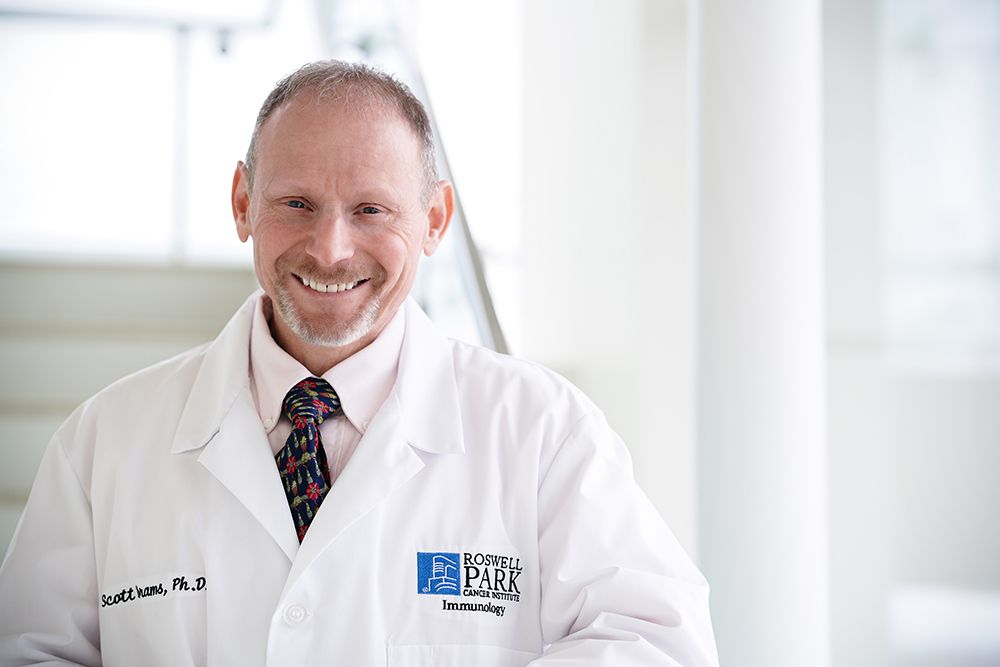Team uncovers pathway linked to cancer spread — with potential applications for a class of existing biologic agents
- Studies unveil new mechanism that explains increased metastasis to the lung
- Elevated Wnt/beta-catenin signaling in macrophages drives a metastatic program
- Findings may have broader significance for metastasis at other tissue sites
BUFFALO, N.Y. — Metastasis, or the spread of cancer from one site in the body to another, remains a leading cause of cancer-related deaths. Understanding how solid tumors spread is crucial to the effort to improve patient outcomes. A team of scientists led by Scott Abrams, PhD, at Roswell Park Comprehensive Cancer Center uncovered a pathway associated with metastases to the lung, a common site for cancer spread. The work, just published in the journal JCI Insight, has potentially significant implications that may point the way to new cancer therapies.
Macrophages are a type of white blood cell derived from the bone marrow and or other tissues in the body that play critical roles in maintaining tissue integrity and ensuring effective defense against diseases including cancer. The team’s preclinical findings in laboratory models of breast cancer and melanoma have revealed a novel pathway in macrophages that allows these cells of the immune system to be co-opted by cancer, leading to increased metastasis to the lung.
“We identified a population of tissue-resident macrophages common in the lungs — alveolar macrophages — that can be rendered pro-metastatic through an alteration in a pathway known as Wnt/beta-catenin,” says Dr. Abrams, senior study author, Distinguished Member and Professor of Oncology and Co-Leader of the Cancer Center Support Grant Tumor Immunology and Immunotherapy Program at Roswell Park. “When this happens, we see enhanced production of a circulating protein called TNF-alpha, long known for its complex role, both positive and negative, in cancer immunology.”
While the role of bone marrow-derived macrophages in metastasis has been well described, our understanding of how tissue-resident macrophages contribute to cancer control remains less clear.
To test their hypothesis that Wnt/beta-catenin expression in alveolar macrophages enhances solid-tumor metastasis, Dr. Abrams, study first author Elliot Kramer, PhD, and colleagues developed novel approaches to genetically alter the expression of this pathway in these macrophages. Additional studies confirmed a positive correlation between the expression of the beta-catenin and TNF genes.
“When the Wnt/beta-catenin pathway is elevated in macrophages, metastasis is enhanced, and an important mediator of that outcome is TNF-alpha. Based on that connection, we then showed that a localized TNF-alpha blockade strategy diminished this metastatic outcome,” says Dr. Abrams.
These findings suggest opportunities for repurposing TNF antagonists — a class of biologic agents currently approved for the treatment of some autoimmune diseases — as a targeted, locally delivered, anti-metastatic therapy in circumstances where tumors have developed resistance to the killing actions of TNF-alpha.
“Given the expansion of Wnt/beta-catenin-targeted clinical trials in oncology, we believe our work is a timely and significant advance in the field, demonstrating a novel mechanism and therapeutic approach for exploiting this pathway in alveolar macrophage-solid tumor biology,” says Dr. Abrams. “Because the lung is a common site of metastasis in multiple types of malignancies, we expect that our work may hold relevance for the field of tumor immunology at large.”
Collaborators include scientists from the Paul Klein Center for Immune Intervention at Johannes Gutenberg-University in Mainz, Germany, and the Graduate School of Medicine at Kyoto University in Kyoto, Japan.
This work was supported by grants from the National Cancer Institute and National Institutes of Health (project numbers P30CA016056, S10OD025183, R01CA172105, R01CA250412, F30CA254327, F31CA243304 and F31CA228396), the Sklarow Memorial Trust and the Roswell Park Alliance Foundation.
###
Roswell Park Comprehensive Cancer Center is a community united by the drive to eliminate cancer’s grip on humanity by unlocking its secrets through personalized approaches and unleashing the healing power of hope. Founded by Dr. Roswell Park in 1898, it is the only National Cancer Institute-designated comprehensive cancer center in Upstate New York. Learn more at www.roswellpark.org, or contact us at 1-800-ROSWELL (1-800-767-9355) or ASKRoswell@RoswellPark.org.
Rebecca Vogt, Media Relations Specialist
716-845-4919; rebecca.vogt@roswellpark.org
